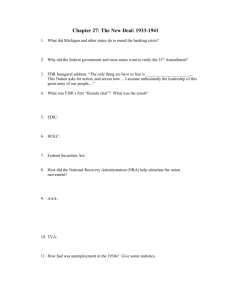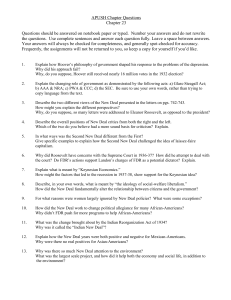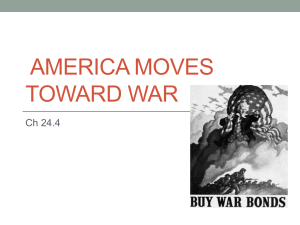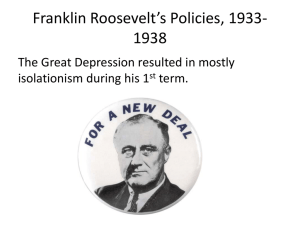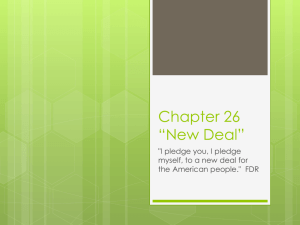Chapter #33: The Great Depression and the New Deal –...
advertisement
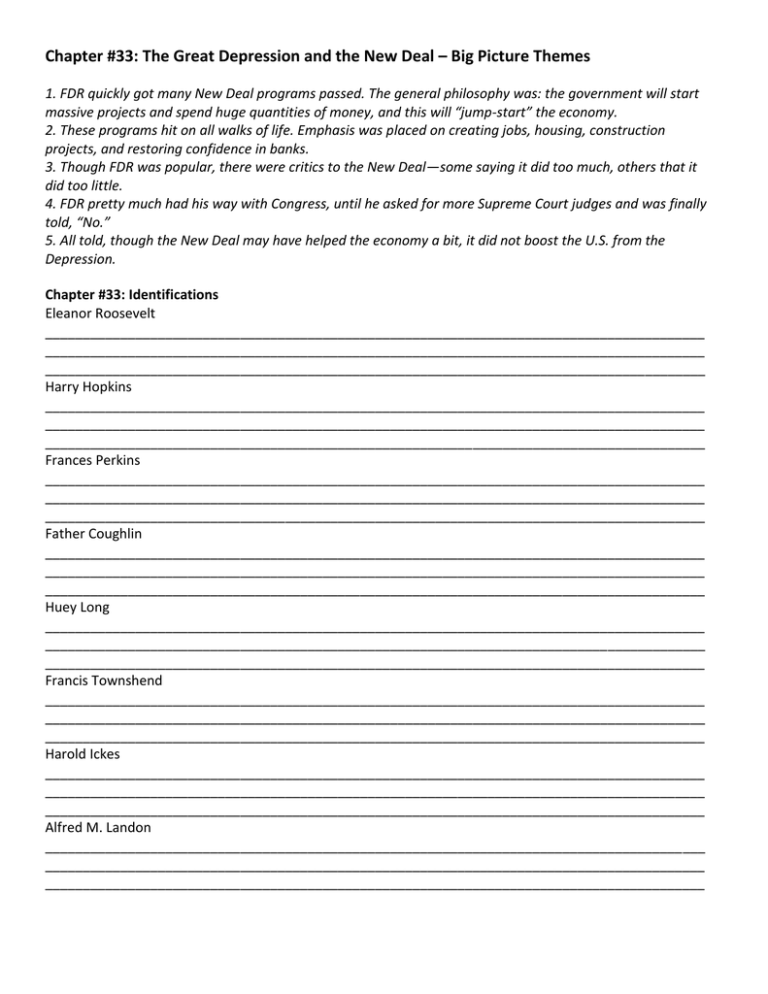
Chapter #33: The Great Depression and the New Deal – Big Picture Themes 1. FDR quickly got many New Deal programs passed. The general philosophy was: the government will start massive projects and spend huge quantities of money, and this will “jump-start” the economy. 2. These programs hit on all walks of life. Emphasis was placed on creating jobs, housing, construction projects, and restoring confidence in banks. 3. Though FDR was popular, there were critics to the New Deal—some saying it did too much, others that it did too little. 4. FDR pretty much had his way with Congress, until he asked for more Supreme Court judges and was finally told, “No.” 5. All told, though the New Deal may have helped the economy a bit, it did not boost the U.S. from the Depression. Chapter #33: Identifications Eleanor Roosevelt ________________________________________________________________________________________ ________________________________________________________________________________________ ________________________________________________________________________________________ Harry Hopkins ________________________________________________________________________________________ ________________________________________________________________________________________ ________________________________________________________________________________________ Frances Perkins ________________________________________________________________________________________ ________________________________________________________________________________________ ________________________________________________________________________________________ Father Coughlin ________________________________________________________________________________________ ________________________________________________________________________________________ ________________________________________________________________________________________ Huey Long ________________________________________________________________________________________ ________________________________________________________________________________________ ________________________________________________________________________________________ Francis Townshend ________________________________________________________________________________________ ________________________________________________________________________________________ ________________________________________________________________________________________ Harold Ickes ________________________________________________________________________________________ ________________________________________________________________________________________ ________________________________________________________________________________________ Alfred M. Landon ________________________________________________________________________________________ ________________________________________________________________________________________ ________________________________________________________________________________________ Brain Trust(s) ________________________________________________________________________________________ ________________________________________________________________________________________ ________________________________________________________________________________________ The three R's ________________________________________________________________________________________ ________________________________________________________________________________________ ________________________________________________________________________________________ National Labor Relation Board ________________________________________________________________________________________ ________________________________________________________________________________________ ________________________________________________________________________________________ Congress of Industrial Organizations ________________________________________________________________________________________ ________________________________________________________________________________________ ________________________________________________________________________________________ Liberty League ________________________________________________________________________________________ ________________________________________________________________________________________ ________________________________________________________________________________________ Court-packing scheme ________________________________________________________________________________________ ________________________________________________________________________________________ ________________________________________________________________________________________ Chapter #33 Guided Reading Questions FDR: A Politician in a Wheelchair Know: Franklin Delano Roosevelt, Eleanor Roosevelt 1 What kind of man was FDR? Presidential Hopefuls of 1932 2. What was Roosevelt's campaign message in the 1932 election? The Humiliation of Hoover in 1932 3. What were the immediate results of Roosevelt's victory? FDR and the Three R's: Relief, Recovery, Reform Know: New Deal, Banking Holiday, Hundred Days, Three R's, 4. Describe the New Deal. Roosevelt Manages the Money Know: Fireside Chats, Glass-Steagall Banking Reform Act, Federal Deposit Insurance Corporation, Managed Currency 5. What were the key aspects of FDR's monetary policy? Creating Jobs for the Jobless Know: Pump Priming, CCC, FERA, Harry Hopkins, AAA, HOLC, CWA 6. Explain the difference between New Deal agencies and what radical critics wanted the government to do. A Day for Every Demagogue Know: Father Charles Coughlin, Huey Long, Dr. Francis E. Townsend, WPA 7. List other historical demagogues. New Visibility for Women Know: Frances Perkins, Mary McLeod Bethune, Ruth Benedict, Margaret Mead, Pearl Buck 8. Explain the factors that made it possible for these women to gain fame. Helping Industry and Labor Know: NRA, Sick Chicken Decision, PWA, Harold Ickes 9. How did the NRA attempt to restore industry? Paying Farmers Not to Farm 10. How did the federal government attempt to help farmers? Dust Bowls and Black Blizzards Know: Dust Bowl, Okies and Arkies, The Grapes of Wrath, Indian Reorganization Act 11. How did nature cause problems for some farmers on the plains? Makers of America: The Dust Bowl Migrants Know: San Joaquin Valley, Farm Security Administration, Okievilles 12. In what ways were things better in California? In what ways were they the same? Battling Bankers and Big Business Know: Federal Securities Act, SEC 13. "Reformist New Dealers were determined from the outset to curb the `money changers....'" Explain. The TVA Harnesses the Tennessee River Know: TVA, Creeping Socialism 14. What arguments were used for and against the TVA project? Housing Reform and Social Security Know: FHA, Social Security 15. How did the FHA and Social Security attempt to help some of society's least fortunate? A New Deal for Labor Know: Wagner Act, National Labor Relations Board, CIO, John L. Lewis, Sit-down Strike 16. How did labor respond to the improvement of conditions brought about by the New Deal? Landon Challenges "the Champ” Know: Alfred Landon, American Liberty League 17. What was the significance of the 1936 election? Nine Old Men on the Supreme Bench 18. Why did Roosevelt ask Congress for a bill that would allow him to add justices to the Supreme Court? The Court Changes Course Know: Court Packing, Hugo Black 19. What were the consequences of FDR's attempt to pack the Court? The Twilight of the New Deal Know: Roosevelt Recession, John Maynard Keynes, Hatch Act 20. Assess the successfulness of FDR in his second term. New Deal or Raw Deal? 21. What criticism of the New Deal seems most fair to you? Least fair? Varying Viewpoints: How Radical Was the New Deal Know: Arthur Schlesinger Jr., Carl Degler, Constraints School of Historians, New Deal Coalition 22. What did William Leuechtenburg mean when he called the New Deal a "half-way revolution?" (Your answer should focus more on the information before this term than on the information after it.) Chapter #34: Franklin D. Roosevelt and the Shadow of War – Big Picture Themes 1. When it became evident that both Japan and Germany were marching toward militarism, FDR (and Europe) made it clear they wanted peace. This effectively gave the dictators a “go-ahead” sign. 2. Events showed war as inevitable. Japan attacked China. Spain became a dictatorship, and Italy and Germany did as well. 3. After watching Hitler go on the move, he finally broke a pledge to not attack Poland. England and France went to war. The U.S. still wanted to stay out. 4. As the situation overseas deteriorated, the U.S. began to support England and France more openly with words and supplies. Finally, when Pearl Harbor was attacked, the U.S. entered WWII. Chapter #34: IDENTIFICATIONS Nuremburg Trials ________________________________________________________________________________________ ________________________________________________________________________________________ ________________________________________________________________________________________ Cordell Hull ________________________________________________________________________________________ ________________________________________________________________________________________ ________________________________________________________________________________________ Winston Churchill ________________________________________________________________________________________ ________________________________________________________________________________________ ________________________________________________________________________________________ Charles Lindbergh ________________________________________________________________________________________ ________________________________________________________________________________________ ________________________________________________________________________________________ Good Neighbor Policy ________________________________________________________________________________________ ________________________________________________________________________________________ ________________________________________________________________________________________ Reciprocal Trade Agreement Act ________________________________________________________________________________________ ________________________________________________________________________________________ ________________________________________________________________________________________ Rome-Berlin Axis ________________________________________________________________________________________ ________________________________________________________________________________________ ________________________________________________________________________________________ Nye Committee ________________________________________________________________________________________ ________________________________________________________________________________________ ________________________________________________________________________________________ Neutrality Acts ________________________________________________________________________________________ ________________________________________________________________________________________ ________________________________________________________________________________________ Russo-German Nonaggression Pact ________________________________________________________________________________________ ________________________________________________________________________________________ ________________________________________________________________________________________ "cash and carry" ________________________________________________________________________________________ ________________________________________________________________________________________ ________________________________________________________________________________________ America First Committee ________________________________________________________________________________________ ________________________________________________________________________________________ ________________________________________________________________________________________ Lend-Lease Act ________________________________________________________________________________________ ________________________________________________________________________________________ ________________________________________________________________________________________ Atlantic Charter ________________________________________________________________________________________ ________________________________________________________________________________________ ________________________________________________________________________________________ Chapter #34 Guided Reading Questions The London Conference Know: London Economic Conference 1. What were the results of Roosevelt's decision not to help stabilize currencies? Freedom for (from?) the Filipinos and Recognition for the Russians Know: Tydings-McDuffie Act 2. What was the reason for America's decision to free the Philippines? Becoming a Good Neighbor Know: Good Neighbor Policy 3. Was the United States serious about the Good Neighbor policy? Explain. Secretary Hull's Reciprocal Trade Agreements Know: Cordell Hull, Reciprocal Trade Agreements Act 4. Were reciprocal trade agreements a good idea? Explain. Storm-Cellar Isolationism Know: Joseph Stalin, Benito Mussolini, Adolf Hitler, Fascism 5. What were the reasons for American isolationism? Congress Legislates Neutrality Know: Gerald Nye, Neutrality Acts 6. How did the Neutrality Acts attempt to keep the U.S. out of war? America Dooms Loyalist Spain Know: Francisco Franco, Spanish Civil War 7. How did the Spanish Civil War contribute to WWII? Appeasing Japan and Germany Know: Quarantine Speech, Panay, Rhineland, Sudentenland, Munich Conference, Appeasement 8. What actions were taken by fascist governments that showed that they were a threat? Hitler's Belligerency and U.S. Neutrality Know: Nazi-Soviet Nonaggression Pact, Cash and Carry 9. How did the United States respond to the start of WWII in Europe? The Fall of France Know: Phony War, Blitzkrieg, Winston Churchill 10. What further steps did the United States take after the fall of France? Makers of America: Refugees from the Holocaust Know: Anti-Semitism, Albert Einstein, American Jewish Committee, Father Coughlin, American Jewish Congress 11. Why did America not make more room for European Jews in the 1930's? Bolstering Britain with the Destroyer Deal (1940) Know: Battle of Britain, Royal Air Force, Fortress America, America First, Charles Lindbergh, Destroyer Deal 12. Describe the conflict between interventionists and isolationists in America in 1940. FDR Shatters the Two-Term Tradition (1940) Know: Wendell Wilke 13. Interpret the results of the 1940 election. Congress Passes the Landmark Lend-Lease Law Know: Lend-Lease 14. What was so controversial about Lend-Lease? Hitler's Assault on the Soviet Union Spawns the Atlantic Charter Know: Atlantic Charter 15. What was the reaction in America to the Nazi attack on the Soviet Union? U.S. Destroyers and Hitler's U-Boats Clash 16. How did America's implementation of the Lend-Lease policy bring us closer to war? America's Transformation from Bystander to Belligerent 17. Was United States entry into WWII sudden or gradual? Explain. Chapter #35: America in World War II – Big Picture Themes 1. The first goal of the U.S. in the war was to mobilize. This meant signing up thousands of troops, and switching the American economy over to war. For example, it was time to stop making sedans, and start building bombers. 2. The war affected all Americans. Men (of all races) went to war and women took the jobs the men had left. 3. In the Pacific, the U.S. “island hopped” over four years from Hawaii all the way to Okinawa and were “knocking on Japan’s door.” Finally, the atomic bomb drove Japan to surrender. 4. In Europe, the U.S. and her allies worked from North Africa up through Italy and toward the “soft underbelly” of Germany. Then, the massive D-Day invasion drove the Nazis back to Germany where Hitler committed suicide and his generals surrendered. Chapter #35: IDENTIFICATIONS A. Philip Randolph ________________________________________________________________________________________ ________________________________________________________________________________________ ________________________________________________________________________________________ George S. Patton ________________________________________________________________________________________ ________________________________________________________________________________________ ________________________________________________________________________________________ Albert Einstein ________________________________________________________________________________________ ________________________________________________________________________________________ ________________________________________________________________________________________ Office of Price Administration ________________________________________________________________________________________ ________________________________________________________________________________________ ________________________________________________________________________________________ Fair Employment Practice Commission ________________________________________________________________________________________ ________________________________________________________________________________________ ________________________________________________________________________________________ D-Day ________________________________________________________________________________________ ________________________________________________________________________________________ ________________________________________________________________________________________ V-E Day ________________________________________________________________________________________ ________________________________________________________________________________________ ________________________________________________________________________________________ Manhattan Project ________________________________________________________________________________________ ________________________________________________________________________________________ ________________________________________________________________________________________ Braceros ________________________________________________________________________________________ ________________________________________________________________________________________ ________________________________________________________________________________________ Chapter #35: Guided Reading Questions The Allies Trade Space for Time Know: Germany First 1. "America's task was far more complex and back-breaking [in World War II] than in World War I." Explain. The Shock of War Know: Axis Powers, Internment Camps, Korematsu v. U.S. 2. How did the war affect liberal ideals and goals at home? Building the War Machine Know: War Production Board, War Labor Board 3. What effects did the war have on manufacturing, agriculture and labor? Makers of America: The Japanese Know: Matthew Perry, Meiji Government, Picture Brides, Gentleman's Agreement, Issei, Nissei 4. In what way can it be said that the reasons for Japanese immigrants' success also caused them trouble? Manpower and Womanpower Know: WAACS, WAVES, SPARS, GI, Braceros, Rosie the Riveter 5. What opportunities were opened to women as a result of the war? Wartime Migrations Know: A. Philip Randolph, Fair Employment Practices Commission, Double V, CORE, Code Talkers, Zoot Suit Riots 6. What effect did the war have on the nation's minorities? Holding the Homefront 7. What economic effects resulted from American participation in the war? The Rising Sun in the Pacific Know: Douglas MacArthur, Bataan Death March 8. Describe Japanese victories in the Pacific in the months following Pearl Harbor. Japan's High Tide at Midway Know: Battle of the Coral Sea, Midway, Chester Nimitz 9. Why was Midway an important battle? American Leapfrogging Toward Tokyo Know: Guadalcanal, Island Hopping, Guam 10. What strategy did the United States use to defeat the Japanese? The Allied Halting of Hitler Know: Wolf Packs, Enigma, Erwin Rommel, Bernard Montgomery, El Alamein, Battle of Stalingrad 11. "The war against Hitler looked much better at the end of 1942 than it had in the beginning." Explain. A Second Front from North Africa to Rome Know: Soft Underbelly of Europe, Dwight D. Eisenhower, Casablanca, Sicily 12. Describe the purpose and outcome of the Invasion of North Africa. D-Day: June 6, 1944 Know: Teheran, D-Day, Normandy, George Patton 13. Why could June 6, 1944 be considered THE turning point of the war? FDR: The Fourth-Termite of 1944 Know: Thomas Dewey, Henry Wallace, Harry S Truman 14. Why was the choice of a vice-presidential candidate important and difficult for the democrats in 1944? Roosevelt Defeats Dewey Know: Fala 15. What factors led to Roosevelt's victory over Dewey? The Last Days of Hitler Know: Battle of the Bulge, "Nuts," Elbe River, Holocaust, V-E Day 16. Describe the last six months of war in Europe. Japan Dies Hard Know: Iwo Jima, Okinawa, Kamikazes 17. Explain the meaning of the title of this section. The Atomic Bombs Know: Potsdam, Hiroshima, Nagasaki, Hirohito 18. What was the military impact of the atomic bomb? The Allies Triumphant Know: George Marshall 19. "This complex conflict was the best fought war in America's history." Explain Varying Viewpoints: The Atomic Bombs: Were They Justified? 20. What questions concerning WWII have historians attempted to answer?
